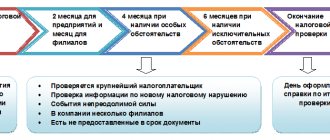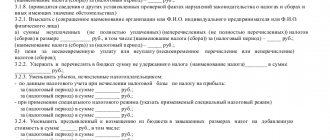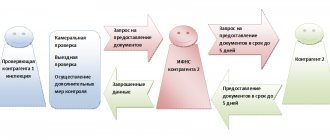In what situations can the Federal Tax Service request materials under Article 93.1 of the Tax Code of the Russian Federation?
Until April 1, 2020, the article in question allowed tax authorities to request documents from a company or individual entrepreneur in two cases:
- as part of tax audits of their counterparties (clause 1 of Article 93.1 of the Tax Code of the Russian Federation) - desk or field;
- outside the scope of inspections - if there is a motivated need to obtain information or documentation about a specific transaction (Clause 2 of Article 93.1 of the Tax Code of the Russian Federation).
Thus, inspectors can now request documents and information materials on the activities of the taxpayer being inspected from the counterparty or from other persons who possess them when assigning additional control procedures during the consideration of tax audit materials. Outside the framework of tax audits, inspectors have the right to request documents (information) on a certain transaction from the parties to it or from other persons who have them, only if there is really a justified need for this.
From 04/01/2020, the powers of controllers under Art. 93.1 of the Tax Code of the Russian Federation has been expanded: they have received the right to request documents and information as part of the procedure for collecting large tax arrears.
For information on how an on-site audit is carried out, read the material “Procedure for conducting an on-site tax audit (nuances)” .
It is noteworthy that initially it was only possible to request information outside of tax audits, but not documents. Thanks to this, we had the legal opportunity to respond to tax requirements in a slightly abbreviated version - after all, the concepts of “information” and “documents” are not defined by the legislator as equivalent, and this fact was recognized by many courts.
However, the law “On Amendments to Certain Legislative Acts of the Russian Federation...” dated June 28, 2014 No. 134-FZ changed the situation, and now clause 2 of Art. 93.1 of the Tax Code of the Russian Federation completely legally allows tax authorities to demand everything - both information information and documents. Ignoring the fulfillment of this obligation by the taxpayer may result in the collection of penalties for him, and liability arises under clause 2 of Art. 126 or under Art. 129.1 Tax Code of the Russian Federation.
ConsultantPlus experts explained whether tax authorities can request documents outside the framework of tax audits. Get trial access to the system and upgrade to the ready-made solution for free.
For what period can the tax office request documents?
In the above cases, inspectors of the Federal Tax Service may ask for documentation related to the updated declaration or activities of the organization that extend beyond 3 years. Organizations that may be subject to such a deep audit must retain accounting and tax documents for more than 3 years.
The three-year review period for most businesses starts from the date the review decision is made. So, if the decision to study VAT returns was made in December 2021, and the audit began in 2021, then all quarterly tax reports starting from the 4th quarter of 2014 are checked.
The following businesses are required to keep declarations for at least three years:
- organizations and individual entrepreneurs who periodically adjust their reports to the Federal Tax Service;
- registered in the special economic zone of Russia;
- working with foreign companies under PSA;
- investors who have entered into an agreement with the regional authorities.
How is a request made under Article 93.1 of the Tax Code of the Russian Federation?
In order for inspectors to have the right to demand documents from a taxpayer as part of a meeting, the order to obtain documents and the requirement to provide documents must comply with all the standards established by tax legislation.
When requesting documentation from counterparties or other persons, tax authorities are guided by:
- Tax Code of the Russian Federation (clauses 3–4 of Article 93.1);
- by order of the Federal Tax Service of Russia dated November 7, 2018 No. ММВ-7-2/ [email protected] ;
- letter of the Federal Tax Service of Russia “On recommendations for carrying out tax control measures related to tax audits” dated July 17, 2013 No. AS-4-2/12837.
These regulations establish the following rules for requesting documentation:
- The tax authority (let's assign it No. 1), which carries out control procedures in relation to the taxpayer, is allowed to request documents from its counterparty not independently, but only through the tax authority with which this counterparty is registered (let's call this inspection No. 2). True, there is one exception - when the counterparty and the taxpayer being audited are registered with the same inspectorate.
Tax authority No. 1 must send a special order to tax authority No. 2 to request documents (information).
- The order must contain:
- date and place of compilation;
- names of two tax authorities - No. 1 and No. 2;
- name of the taxpayer (let's call him “K” - counterparty) from whom you need to request documentation: his name (for individuals - last name, first name, patronymic); TIN, checkpoint, location (or place of residence);
- lists of required documents and information information, and their individualizing characteristics must be indicated;
- data about the transaction that allows it to be identified;
- name of the person in respect of whom the inspection is being carried out;
- the name of the control procedure within which the need arose to request documents and information;
- signature of the head of the tax authority (or his deputy) indicating the rank;
- stamp of the tax authority.
Having received the order, tax authority No. 2, within 5 working days, is obliged to send a request for the provision of documents (information) to person “K”, who is registered with him. To this requirement, tax authority No. 2 is obliged to attach a copy of the order to request documents issued by authority No. 1. The request must contain the same list of information as the order.
Let's note a few important nuances:
- According to Art. 93.1 of the Tax Code of the Russian Federation, tax authorities do not have the right to demand from “K” documentation that he had already provided earlier as part of verification activities (letter of the Ministry of Finance of the Russian Federation dated February 11, 2015 No. 03-02-07/1/5991).
- Even if the number of documents requested from “K” is huge, and significant sums are spent on sending and copying them, it will not be possible to reimburse these expenses. This follows from the letter of the Ministry of Finance of the Russian Federation dated May 10, 2012 No. 03-02-07/1-116.
- 5 days are given to fulfill the requirement. If too many documents are requested, you can send a request to the tax authority to extend the deadline for responding to the request. But it is worth considering that this possibility is enshrined in Art. 93.1 of the Tax Code of the Russian Federation as the right of the tax authority, and not as its obligation.
In what form to submit a notification about the impossibility of submitting documents (information) on time, find out from the publication.
How to quickly send a large number of documents to the Federal Tax Service
Often the number of documents specified in the requirement amounts to tens, hundreds and even thousands. It takes a lot of time and effort to prepare and send such an impressive package to the inspection. And even if the Federal Tax Service extends the deadline for submitting documents, it can be difficult to meet it.
In this regard, many companies and entrepreneurs use modern services that make it easier and faster to send documents to the inspectorate. Such services, in particular, include “Connector Kontur.Extern”. It makes it possible to send tens of thousands of electronic documents to tax authorities at a time, while approximately 9 thousand documents are processed per hour.
Through the “Connector” you can transfer to the Federal Tax Service any electronic documents created in approved formats (for example, invoices, TORG-12 invoices, etc.). Such documents are sent in the form of XML files. Also, “Connector” sends scanned images of any documents created on paper: acts, contracts, bills, etc. Scanned images are transmitted in the following formats: pdf, jpg, png, tiff. An inventory of sent documents is generated automatically.
Taxpayers who have to submit a lot of “primary information” to the Federal Tax Service proceed as follows. They install the “Kontur.Extern Connector” on different computers and start parallel sending. Thus, the risk of missing the deadlines for submitting documents is reduced to zero.
Results
According to Art. 93.1 of the Tax Code of the Russian Federation, tax authorities have the right to request documents from a company or individual entrepreneur as part of tax audits of their counterparties, as well as outside the scope of audits - for a specific transaction.
Controllers have the right to request documents (information) for any period and for any counterparty or transaction.
Sources:
- Tax Code of the Russian Federation
- Federal Law “On Accounting” dated December 6, 2011 No. 402-FZ
- Order of the Federal Tax Service of Russia dated November 7, 2018 No. ММВ-7-2/ [email protected]
- letter of the Federal Tax Service of Russia “On recommendations for carrying out tax control activities related to tax audits” dated July 17, 2013 No. AS-4-2/12837
- Resolution of the Federal Antimonopoly Service of the Far Eastern District dated November 2, 2012 No. F03-5016/2012 in case No. A51-3991/2012
You can find more complete information on the topic in ConsultantPlus. Free trial access to the system for 2 days.
Periods covered by on-site inspection
Situation: can the inspection, as part of an on-site tax audit, control the current year (the year in which the decision to conduct an on-site audit was made)?
Answer: yes, it can.
The three-year period provided for by law limits only the lower limit of the period that can be covered by an on-site inspection (clause 4 of Article 89 of the Tax Code of the Russian Federation). The upper limit of this period is limited by the date of the decision to conduct an on-site inspection. The fact is that the inspection period must be determined in advance and reflected in the decision to conduct it (paragraph 7, paragraph 2, article 89 of the Tax Code of the Russian Federation). This means that the year in which the inspectorate makes a decision to conduct an on-site inspection can be verified up to the date of such a decision (decision of the Supreme Court of the Russian Federation of September 9, 2014 No. 304-KG14-737).
The current year review may include:
- taxes that have a short tax period (month, quarter). For example, VAT, the tax period for which is a quarter (Article 163 of the Tax Code of the Russian Federation);
- taxes for which the tax period is a calendar year, for example, income tax (Article 285 of the Tax Code of the Russian Federation).
In the second case, during the audit, the inspectorate will monitor the correctness of payment not of the tax itself, but of advance payments for it, since the tax period has not yet ended. If the audit reveals late transfer of advance payments, the organization may be assessed penalties. At the same time, the tax inspectorate has no right to fine an organization for such a violation. This procedure is provided for in paragraph 3 of Article 58 of the Tax Code of the Russian Federation.
The legality of this approach is also confirmed by arbitration practice (see, for example, decisions of the FAS Volga District dated December 6, 2012 No. A72-2607/2012, Moscow District dated April 15, 2009 No. KA-A40/3000-09-P, Vostochno -Siberian District dated January 29, 2009 No. A19-3295/08-50-F02-7091/08, dated October 17, 2007 No. A69-3781/05-F02-2938/2007, Northwestern District dated December 2 2008 No. A52-5071/2007, Far Eastern District dated September 20, 2007 No. F03-A37/07-2/2195).
It should be noted that in relation to organizations that are tax agents, exemption from tax liability for late transfer of taxes to the budget does not apply. The fact is that the obligation of tax agents to transfer withheld tax amounts to the budget is not associated with the end of reporting (tax) periods, but with the moment of payment of income to taxpayers. This follows from the provisions of subparagraph 1 of paragraph 3 of Article 24, Articles 161 and 174, paragraph 6 of Article 226, Articles 287 and 310 of the Tax Code of the Russian Federation. Thus, if during the audit it is discovered that the organization, as a tax agent, violated the deadlines for paying withheld taxes, the inspection has the right not only to charge it a penalty (clause 7 of Article 75 of the Tax Code of the Russian Federation), but also to fine it under Article 123 of the Tax Code of the Russian Federation.
In arbitration practice there are examples of court decisions confirming the legitimacy of this conclusion (see, for example, the rulings of the Supreme Court of the Russian Federation dated September 9, 2014 No. 304-KG14-737 and the Supreme Arbitration Court of the Russian Federation dated April 26, 2013 No. VAS-4862/13, resolutions of the Federal Antimonopoly Service of the North-Western District dated April 19, 2011 No. A56-25496/2010, dated March 18, 2011 No. A56-18448/2010, West Siberian District dated April 4, 2011 No. A03-9949/2010, Ural District dated January 27, 2011 No. F09-11127/10-S2).
Situation: can the inspectorate monitor the 1st, 2nd and 3rd quarters of 2011 as part of an on-site inspection? The decision to conduct an audit was made in the fourth quarter of 2014.
Answer: yes, it can.
As part of an on-site inspection, the inspectorate can monitor any periods that do not extend beyond three full calendar years (from January 1 to December 31) preceding the year the decision to conduct the inspection was made (paragraph 2, paragraph 4, article 89 of the Tax Code of the Russian Federation). In this case, the quarter (month) in which the decision was made does not matter. If the decision to conduct an on-site inspection was made in 2014 (no matter what quarter or month of a given year), the inspection can inspect any of the periods that fall in 2011, 2012 and 2013. The first, second and third quarters of 2011 fall within the specified period. Therefore, the inspection has every right to check them. In arbitration practice, there are examples of court decisions confirming the legitimacy of this conclusion (see, for example, decisions of the FAS Volga District dated August 20, 2009 No. A55-9816/2008, dated July 3, 2009 No. A57-8348/2008, East Siberian District dated May 5, 2009 No. A33-10180/07-F02-1850/09, Ural District dated April 21, 2009 No. F09-1805/09-S3).
Situation: can an inspection, as part of an on-site inspection, control a period that has already been inspected as part of a desk inspection?
Answer: yes, it can.
Tax legislation establishes a ban on repeated audits of the same period for the same tax (clause 5 of Article 89 of the Tax Code of the Russian Federation). But this rule only applies to on-site inspections. In other words, if an inspectorate monitored a period for a specific tax during an on-site inspection, then it will not be able to conduct another on-site inspection for the same period in relation to the same tax. For exceptions to this rule, see When tax audits are repeated.
The fact that the inspection conducted a desk inspection is of no importance and does not have any impact on the period of the on-site inspection. In arbitration practice there are examples of court decisions confirming the legitimacy of this conclusion (see, for example, the decisions of the Supreme Arbitration Court of the Russian Federation dated April 27, 2010 No. VAS-5083/10, dated May 19, 2009 No. VAS-1588/09, decisions of the FAS Povolzhsky District dated March 4, 2010 No. A65-26158/2009, Northwestern District dated December 2, 2008 No. A52-5071/2007, Far Eastern District dated May 19, 2008 No. F03-A04/08-2/1276) .
Situation: can the inspection change the period of the on-site inspection during its conduct?
Answer: yes, it can.
Specific periods of on-site inspections must be indicated in the inspectorate’s decision to conduct an on-site inspection (paragraph 7, paragraph 2, article 89 of the Tax Code of the Russian Federation). The Tax Code of the Russian Federation does not prohibit the inspectorate from making changes to this decision (clause 2 of Article 89 of the Tax Code of the Russian Federation).
Moreover, by order of the Federal Tax Service of Russia dated May 7, 2007 No. MM-3-06/281, a special form of the decision to amend the decision to conduct an on-site inspection was approved.
Based on the above, we can conclude that the inspection has the right to make changes to the inspection decision during the inspection, in particular, change the inspection period. In this case, the new verification period must be indicated in a special decision, which is an annex to the main decision.
Arbitration courts confirm the legitimacy of this conclusion (see, for example, the resolution of the Federal Antimonopoly Service of the Moscow District dated September 11, 2009 No. KA-A41/7737-09).
Situation: is it possible to challenge the decision of the inspectorate based on the results of an on-site inspection? The inspection went beyond the three-year limitation on the inspection period.
Answer: yes, it is possible, in terms of those conclusions that are made regarding periods that are not subject to on-site inspection.
As part of an on-site inspection, the inspectorate can monitor any periods that do not exceed three calendar years preceding the year the decision to conduct the inspection was made (paragraph 2, paragraph 4, article 89 of the Tax Code of the Russian Federation). Going beyond the three-year limit will be a violation on the part of the inspectorate. Therefore, the inspector’s decision based on the results of the on-site inspection can be challenged in that part of the findings that relate to periods not subject to the on-site inspection (paragraph 1, clause 12, article 101 of the Tax Code of the Russian Federation).
In arbitration practice there are examples of decisions confirming the legitimacy of this conclusion (see, for example, decisions of the FAS of the North-Western District dated April 30, 2009 No. A05-11647/2008, Volga-Vyatka District dated October 27, 2008 No. A39-1580 /2008, North Caucasus District dated October 13, 2008 No. F08-6070/2008).
Situation: is it possible to challenge the decision of the inspectorate based on the results of an on-site inspection? The inspectorate examined the period, which falls within the three-year limit, but exceeds the period specified in the decision to conduct the inspection.
Answer: yes, it is possible, but only in that part of the conclusions that are made in relation to periods not specified in the decision to conduct an audit.
Specific periods for on-site inspections must be determined in advance and indicated in the decision to conduct an inspection (paragraph 7, paragraph 2, article 89 of the Tax Code of the Russian Federation). Inspectors cannot deviate from them. Otherwise, the inspection decision based on the results of the on-site inspection can be canceled, but only in that part of the conclusions that were made in relation to periods not indicated in the decision. In arbitration practice there are examples of court decisions confirming the legitimacy of this conclusion (see, for example, the resolution of the Federal Antimonopoly Service of the Ural District dated September 15, 2009 No. F09-6838/09-S3).
How the tax office sends requirements
The Tax Inspectorate is given the right to submit claims in the following ways (clause 4 of Article 31 of the Tax Code of the Russian Federation):
- hand over receipt directly to the person to whom the demand is addressed or to his representative;
- send by registered mail;
- send in electronic form via TKS through an electronic document management operator;
- post the request in the taxpayer’s personal account.
The right of the tax inspectorate to choose the method of sending a demand is limited only in relation to companies that, according to the Tax Code of the Russian Federation, are required to submit tax reports in electronic form. The vast majority of such companies. Tax officials must send requests to these organizations only electronically.
If an organization submits tax reports in electronic form, then requests for the submission of documents are sent to it in electronic format (clause 4 of Article 31 of the Tax Code of the Russian Federation).
If an organization submits reports on paper, requests for the submission of documents are sent to it on paper by Russian post or handed over against receipt.
An organization that submits electronic reporting is obliged to provide the technical ability to accept electronic documents from the Federal Tax Service via the TKS through an electronic document management operator.
How long are accounting and tax documents stored?
Enterprises maintain separate tax and accounting records, although the primary documentation is almost identical. Regardless of the verification period, the storage period for documents is established by Federal Law No. 402-FZ. It contains a list and shelf life. The minimum term is five years.
A retention period of five years is established for supply agreements, contracts, acts of completion, receipt and expenditure orders, general and cash books, purchase and sales books, and other primary documentation. Declarations and reports to the Statistics Committee, the Social Insurance Fund, the Pension Fund of the Russian Federation, the Compulsory Medical Insurance Fund, and other regulatory organizations are stored for at least the same amount of time. Business correspondence with contractors and government agencies is preserved. Everything related to personnel records is stored for 75 years: a register of income information, personal cards and employment contracts, individual information submitted to the Pension Fund.
Organizations based on the Code and 402-FZ are recommended to draw up a local act on the storage period of different types of accounting documents.
More details about the storage periods for accounting documents are described in a separate article on our portal.
>
Requirements set as part of the pre-verification analysis.
If you receive a request that contains the phrase “Outside the scope of tax audits” and you are asked to submit documents relating to one or more tax periods, then “congratulations” - you are most likely a candidate for an on-site tax audit.
Let's give an example of a real claim received by a counterparty of one group of companies suspected by tax authorities of artificially splitting up their business:
Such requirements are used very widely by inspectors, and information about you with a similar requirement may be requested from all your counterparties.
The Tax Code of the Russian Federation does not provide for pre-audit analysis among tax control measures, but such requirements will have to be answered.
How not to harm yourself or your counterparty?
If the request and instructions from the tax office contain a standard set of documents, then this usually does not cause problems when preparing a response. Things are more complicated if the request contains many questions about car numbers, F
.
AND
.
O. drivers, about the place of transfer of cargo, about the weight of the cargo,
etc.
d.
Specifics and such detailed requests indicate that tax authorities are point-by-point untangling the chain from the manufacturer to the final buyer for a specific transaction in which they discovered clear signs of violations.
In order not to harm either yourself or your counterparty, do not ignore the inspection request and delay in responding
. If you miss a deadline or ignore a request, inspectors will fine you. At the same time, the tax audit carried out by your partner will also be delayed (subclause 7, clause 2 of Appendix No. 6 to the Federal Tax Service order No. MMV-7-2 / [email protected] dated November 7, 2018).
Keep in mind that all of your transactions may come under suspicion.
. As the tax authorities themselves explain, in such situations, they transfer information about the “refuser” to the pre-audit analysis department. Thus, not responding to an oncoming traffic signal may initiate an on-site inspection at your location, so be careful.
What to do if asked for clarification?
Let us immediately pay attention to the basis on which norm they are asking for clarification.
If based on Article 93.1 of the Tax Code of the Russian Federation, then everything that is written above is relevant.
If, on the basis of clause 3 of Art. 88 of the Tax Code of the Russian Federation, then the tax authority must indicate in the request what errors in the tax return (calculation) and (or) contradictions between the information contained in the submitted documents were revealed by the check, or inconsistencies were identified between the information provided by the taxpayer and the information contained in the documents available from the tax authority, received during tax control.
If the tax authority does not indicate what errors or contradictions have been identified, then responding to it is your right, but not your obligation.
IMPORTANT!
Even then, the requirement should not be ignored. It is advisable to indicate in the answer that when the taxpayer independently checked the declaration submitted by him, no errors or contradictions were identified, and accordingly, the obligation to give any explanations does not arise.
Keep in mind that explanations will have to be given in any case if:
- the amount of loss is declared in the income tax return;
- the taxpayer declared in the declaration transactions (property) for which tax benefits were applied;
- in other cases specified in clauses 8.1, 8.2, 8.5, 8.6, 8.8, 12 art. 88 Tax Code of the Russian Federation.
If subsection is indicated as the basis for requesting documents or information. 3 p. 1 art. 31 of the Tax Code of the Russian Federation, then the taxpayer is not obliged to provide written explanations and documents, however, he will still have to appear at the tax authority and give explanations. Therefore, when receiving a request for information and/or documents based on a notice of summons to the taxpayer’s tax authority, the issue of providing documents and written explanations to the taxpayer should be decided based on how convenient it is for him. In most cases, written explanations drawn up in a calm environment will be more balanced, reasoned and controlled than explanations during a conversation with a tax inspector.
Requirements under “counter checks”.
The list of documents that can be requested directly from the taxpayer is limited within the framework of desk audits (Article 88 of the Tax Code of the Russian Federation). Basically, these are documents confirming the right to apply benefits or the legality of a refund or VAT refund.
However, these restrictions can be easily overcome by the inspector.
If documents related to the taxpayer’s activities cannot be requested during a desk audit from the taxpayer himself, then why not request the documents the inspector is interested in as part of a “counter” audit of each of the taxpayer’s counterparties. It turns out that the inspector is asking for documents not regarding the taxpayer himself, but the documents he has regarding all his counterparties. In fact, it is the taxpayer himself who is being audited. Formally, such demands are legal and in the vast majority of cases it is not possible to challenge them in court.
An important nuance of counter verifications is that the documents and information requested during them must be related to the taxpayer being audited, that is, to your counterparty, in respect of whom the audit is being carried out.
This connection does not have to be direct.
In a situation where you are asked for documents regarding your relationship with your counterparty, but are being checked by a third party (whom you may not know), such a requirement will be legal if your counterparty is a link in the chain of suppliers (buyers) leading to the third party being checked face.
Or, for example, you may be asked to provide information on how you recorded a transaction with a counterparty in your accounting records. The connection of this information with the taxpayer being audited (your counterparty) is not obvious, but the courts recognize the request for such information as lawful.
What may be asked during inspections?
The harsh reality: everything that is in any way connected with the calculation and payment of taxes audited by the inspection can be demanded from anyone.
One gets the strong impression that soon no one will be surprised by the demand, for example, for the birth certificate of the chief accountant, since it is the chief accountant who is responsible for calculating and paying taxes in the company. The other side of the coin is the possibility of tax officials abusing their powers.
And it is precisely because of such abuses, and not at all because of the taxpayer’s desire to hide compromising information, that there is often a reluctance to respond to requests from tax authorities. And sometimes there are outright stupidities.
Thus, quite recently, in the Sverdlovsk region and Chelyabinsk regions, taxpayers received requests asking them to submit “documents confirming the performance of work directly in outer space.”
Most likely, this wording was translated from Art. 164 of the Tax Code of the Russian Federation, which provides for the application of a 0% rate, and was thoughtlessly copied from the requirements set by any of the Roscosmos structures. However, for accountants of other companies such formulations, which gave reason to think about the vast expanses of the universe, caused bewilderment and a grin.








